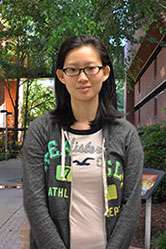Majors: Biochemistry and Molecular Biology
“Qualitative and Quantitative Analysis of the ACS-1 Modification of GAPDH using Tandem Mass Spectrometry”

This project focuses on elucidating the mechanism by which the dithiolethione compound ACS-1 interacts with and affects the activity of the glycolytic enzyme, glyceraldehyde 3-phosphate dehydrogenase (GAPDH). Together with our collaborators, our lab has shown that the chemopreventive actions of ACS-1 are in part due to inhibition of glycolysis via inhibition of GAPDH (manuscript in preparation). Using tandem mass spectrometry, I will test the hypothesis that ACS-1 inhibits GAPDH via covalent modification of its cysteine residues and disulfide bond formation. As inhibition of glycolysis has emerged as a new therapeutic avenue for cancer treatment, our results will provide information to elucidate the mechanism of ACS-1 inhibition of GAPDH. Ultimately, these studies will be critical to translating this discovery into new therapies.
How did you find your mentor for your research project?
It was near the end of my freshman year and I was looking for a research mentor whose lab I could work in starting the fall of my sophomore year. An older student I knew had been working in Dr. Garcin’s lab for some time, and he told me about his project that interested me and his rewarding experience in her lab, so I e-mailed Dr. Garcin about my interest and she gave me a position in her lab.
How did you know this was the project you wanted to do?
I’ve always been interested in proteins and protein structure. This project gave me a chance to apply what I had learned about mass spectrometry during an internship at the New York University School of Medicine last summer.
Do you get course credit for this work?
Yes, I do get academic credit for this work (2 credits).
How much time do you put into it?
It often depends on the week, but usually around 8-12 hours per week.
How did you hear about the Undergraduate Research Award (URA) program?
I heard about the URA program from my mentor and older students who had been URA Scholars, and thought it would be nice to apply and have my project funded.
What academic background did you have before you applied for the URA?
I was a junior at the time, so by that time I had already completed my basic prerequisites plus a number of upper-level courses for my major. I had also worked in my mentor’s lab for over a year and had two summer research experiences elsewhere.
Was the application difficult to do?
No, the application was pretty straightforward.
How much did your mentor help you with the application?
My mentor helped me a lot with editing and tailoring the scope of my project in my application, and I’m really grateful for her time and valuable input.
What has been the hardest part about your research?
The hardest part has been the failures I have encountered in my experiments. It’s often difficult to elucidate why something isn’t working the way you expected, but the joy of successfully completing an experiment and generating new knowledge is beyond what words can describe.
How does your research relate to your work in other classes?
There are times when I’m in a class and the professor talks about something I’m working on or a technique I use in the lab. I always get super excited!
What is your advice to other students about getting involved in research?
Get involved. Don’t be afraid to approach a potential research mentor. If you’re truly interested in what they’re doing and willing to spend the time, they’ll be eager to help you.
8/1/2014